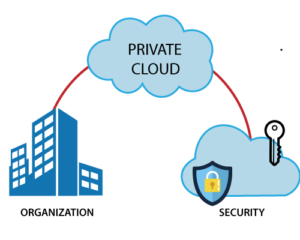What is a Virtual Private Cloud (VPC)?
Virtual Private Cloud (VPC) is a private cloud computing environment located within the public cloud. Basically, a VPC manages logically isolated segments of the public cloud to provide a virtual private environment. Like all cloud environments, VPC resources are available on demand to scale as needed and are highly configurable.

How Does a VPC Differ from a Private Cloud?
A private cloud consists of an infrastructure that is entirely dedicated to a single organization. Typically, an organization will purchase cloud infrastructure, install software, and hire an IT management team. In that case, the organization owns everything from top to bottom. On the other hand, a VPC runs on shared infrastructure like a public cloud. However, a VPC cloud offers a level of isolation between users sharing resources. This layer of isolation is achieved through a private IP subnet or Virtual Local Area Network (VLAN).
Who Needs a VPC?
The organizations that benefit the most from VPCs are the companies that need a private cloud environment but also want public cloud resources and savings.
What features do virtual private clouds come with?
VPCs come with all the features you would expect from a public cloud, including:
Agility
A VPC gives you complete control over the size of your network and the ability to deploy and scale resources at any time.
Affordability
VPCs are cost effective. You will save money on hardware, labor and other related cloud resources. The cloud provider will be responsible for the maintenance and upkeep of all physical servers and software.
Security
Although a VPC is part of the public cloud, VPCs are logically isolated networks so your data and applications are completely separate from your provider’s other clients. Access is limited to your resources, unless you grant it.
Logical isolation makes a VPC environment naturally more secure. However, public cloud security is not automated, even with VPC – it must be deployed deliberately.
Availability
Offers fault and error tolerance availability zone architecture to reduce virtual private cloud downtime and keep applications and workloads available at all times.
Are VPCs Secure?
Virtual Private Clouds can be configured to tighten security at the highest levels. For example, an organization can create virtualized copies of access control features typically used by traditional data centers. Like data center security, a VPC can control access to resources through an IP address.
What Are the Benefits of Using a VPC?
Minimize Downtime
While this is not always possible, customers expect 100% uptime and a little patience for any downtime – not even ten minutes. The VPC environment provides the redundancy and other features needed to meet almost 100% uptime expectations.
With almost 100% uptime, your customers will experience a high level of trust which will strengthen the loyalty and trust in your brand.
Reduced Risk
A VPC will provide you with high security at the instance and subnet level.
While this is not always possible, customers expect 100% uptime and a little patience for any downtime – not even ten minutes. The VPC environment provides the redundancy and other features needed to meet almost 100% uptime expectations
With almost 100% uptime, your customers will experience a high level of trust which will strengthen the loyalty and trust in your brand.
Flexibility
Whether your business is growing or changing, VPCs are flexible enough to grow your business as needed. Cloud infrastructure resources are dynamically deployed, making it easy to adapt VPC to your changing needs.
Cost Savings
Due to the flexible nature of public cloud, you only pay for what you use. With VPC, you won’t have to pay for hardware or software upgrades and you will never pay for maintenance.
A Virtual Private Cloud Will Grow with Your Business
When going to the cloud, using VPC is an inexpensive way to ensure that your network infrastructure will grow over time with your business. For most businesses, investing in private cloud infrastructure makes no sense when a more affordable alternative – VPC – is readily available.
